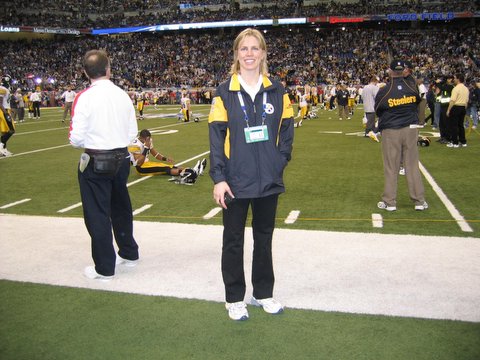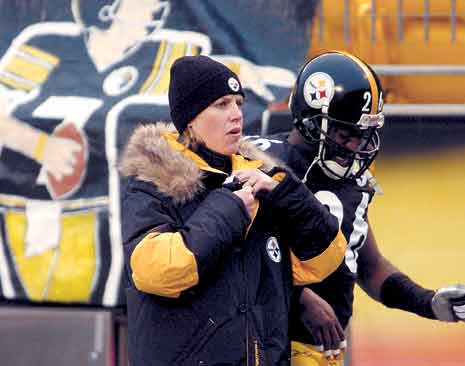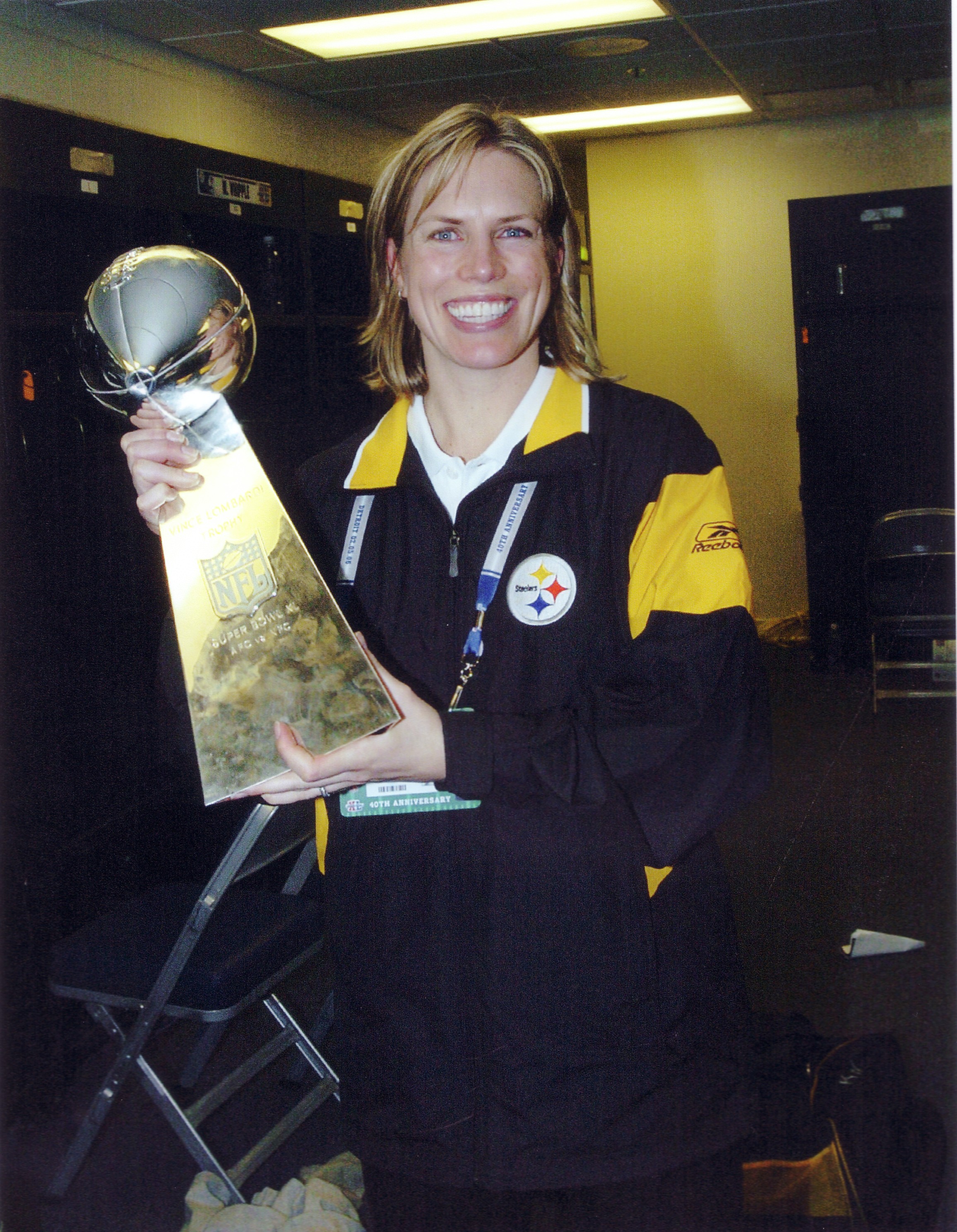FFG: Dr. Robin West
One night at the NFL combine this past February I happened upon a restaurant with a large table of orthopedic surgeons in town repping their teams and assigning medical grades to incoming prospects. Among the group, one diner stood out in particular. She was blond, pretty, perky and well, a she. She was Pittsburgh Steelers orthopedic surgeon, Dr. Robin West.
The mother of two girls, Dr. West has been a fixture in the Pittsburgh sports community for almost a decade. In addition to her role with the Steelers, she is the head physician for the Pitt Panthers men’s basketball team, all under the umbrella of the University of Pittsburgh Medical Center (UPMC). I got a chance to talk with Dr. West about how she landed her dream job, advice she has for women wanting to follow in her footsteps; handling tough injuries in-game and much more.

Melissa Jacobs: What inspired you to become an orthopedic surgeon?
Robin West: What inspired me was in the first grade I had a friend and his father was a surgeon. I remember seeing a knee ball in his office and being intrigued with it. Then I asked for “Gray’s Anatomy of the Human Body” that Christmas. I know, it’s a nerdy thing for a six-year-old. I was just so intrigued by anatomy.
MJ: How did you know you wanted to work with athletes, in particular?
RW: I liked everything about orthopedics and I played sports. The thing I find intriguing about sports is dealing with people who are motivated and often times trying to get back to the level they were before. And I appreciate the fact that I can deal with all ages of athletes. I can take care of an eight-year-old kid, their dad and their grandmother.
As far as my personal athletics, I swam and ran cross-country in high school and then swam at Johns Hopkins. I do triathlons and have run a few marathons. [Dr. West ran the Pittsburgh half-marathon this past weekend]
MJ: What unique challenges do you find being a female in a male-dominated profession for a high-profile team?
RW: Orthopedics is about 6% females, I think. Sports medicine is even lower, somewhere like 2%. Now I’m in the NFL and University of Pittsburgh men’s basketball, all men’s teams. It’s male dominated and pretty old school, especially when it comes to orthopedic surgery. Other than dealing with the daily grind of it, I can’t say anything specific.
The main challenge for me was when I had my kids and I was nursing. That’s the only thing that has differentiated me, honestly. Guys don’t treat me any differently. A lot of the athletes actually come to me. I notice in the NFL a lot of the players have a very strong female role model — a grandmother or mother who has raised them. They look to women as strong. I find some of them search me out for treatment and I think that’s why. And I find that more often in football than in basketball.
MJ: Can you explain the makeup of an NFL team’s medical staff and how you all work together?
RW: For the Steelers there are two head physicians and one head internist, Tony Yates, who has been with them forever, like since 1976. Then there’s the head orthopedist, Jim Bradley. There’s another orthopedic surgeon, that’s me, and an assistant internist, so four us on the field at home games, as well as a neurosurgeon. We are primarily there to help the athletic team in case injuries occur. Then in the stands we have an ophthalmologist and a dentist who are available for us and the other team. For the other team, they typically travel with one or two internists and one or two orthopedic surgeons. It kind of depends on the team and varies throughout the year. For post-season play I traveled, including to the Super Bowl. If we have an injury or a guy we’re trying to watch, I may travel regular season as well.
MJ: How is that relationship between you guys and Coach Tomlin when it coming to on-the-fly, in-game medical decisions?
RW: I feel very good about that, it’s our call. Totally our call. We may analyze a guy, take him back to x-ray at Heinz Field and make our recommendations. Usually the athletic trainer is kind of the go-to person. There are actually three athletic trainers on the field who are the go-between. We may say ‘this guy needs to be watched for five minutes and sit out a few plays.’ The athletic trainers will go and tell coach that.
MJ: How difficult is it dealing with players who most likely want to come back in the game?
RW: I can’t give you specific names of players, but the whole thing is hard. It’s especially difficult now with all the publicity on concussions. Five or ten years ago a player could be with us and say ‘let me back in’ and we may have let him back in. But now there’s such publicity on it if someone has even a minor concussion symptom they need to come out. It’s televised, analyzed. For us to let someone back in who looks at all concussed, we just can’t. What I find over the past two years is that players try and hide their symptoms. Sometimes the only time we know is when they’re down on the field and we have to go out and get them.

MJ: What happens when a player disagrees with your evaluation in the midst of a game?
RW: Yeah, that happens a lot. There are players who will simply say ‘I’m going in.’ Luckily Coach Tomlin stands by us and says ‘no, you’re not.’ Once we say it, it’s a done deal.
I remember one player who went down with a transient quadriplegia. He was numb in fingers and toes and even told us what he had. But he was fine; he even said ‘Doc, I was numb but now the feeling’s come back.’ We sat with him, examined him and neurologically he was fine. But because he had the transient quadriplegia, you always worry about spinal cord contusion. So we boarded him and got in the ambulance for an MRI. But the guy is a total animal, so he ripped the belt off, jumped out of the ambulance and said ‘I’m f’in playing.’ We reminded him that he told us on the field what he had and we couldn’t let him play now. No way. At that point Coach supported us. The player was pissed. And Coach gave him the option to stay on the field and support the team or go home. We can’t examine him, have him say that and let him go back in.
MJ: How do you deal with friends and others in the Pittsburgh community who try and get information? After all, you’re a fantasy football goldmine.
RW: [Laughs] That is very common. I never share any information. There’s really no reason to risk it. I treat athletes just like any other patients. Most people are pretty understanding. I’ll often just try to reiterate what the media is saying. Even with my husband.
MJ: Were you an NFL fan growing up?
RW: Honestly, not really. When they offered me the job they wanted me to do the Steelers as part of the job. My husband is a big Steelers fan and grew up here. I did not. But the history of the Steelers is huge and I figured it was an awesome job. So I decided to read up on the history of the Steelers, as well as the rules and regulations of football. I knew enough but not in great detail.
MJ: Did you feel like you needed that extra education for the Steelers job?
RW: I really did. Just in talking to the players. And really, I did want to know the history of the Steelers. Also to understand the positions better and exactly what each position involves. That just helps me in talking to athletes. If they have a shoulder injury, can they do this or that? It helps me helps them.

MJ: What advice do you have for a young medical student who is reading this and wants to follow your career path?
RW: I get a lot of young women calling me and saying ‘oh, this is the coolest thing in the world.’ I think the most important thing is to work hard, do well in school and all that stuff. Connections are important. Just try to stay in contact with people that you meet. For young women especially, I think a lot of them think they need to use their looks to get in the door. They might dress inappropriately, even send their resume picture looking scantily clothed. That’s not what this is about. This is about not showing your looks.
MJ: So women smart enough to be in medical school are sending in scantily clad pictures?
RW: Yeah, I guess it’s more likely to be from college students who might be looking for a summer internship. There are so many applicants for these positions and they’ll show them to me and there are pictures of women hanging out on the beach. It’s so common, I can’t even tell you. Why would these women do that? It’s really frustrating because the men who are applying are generally in a suit or some type of business look. For women out there serious about their careers, let me reiterate working hard and being reliable. And definitely stay in touch with the contacts you meet along the way.
Click here for more Featured Football Girls.



